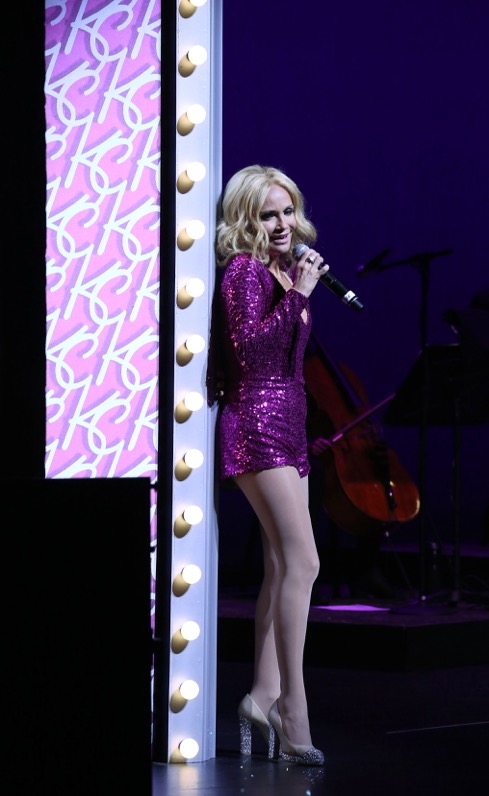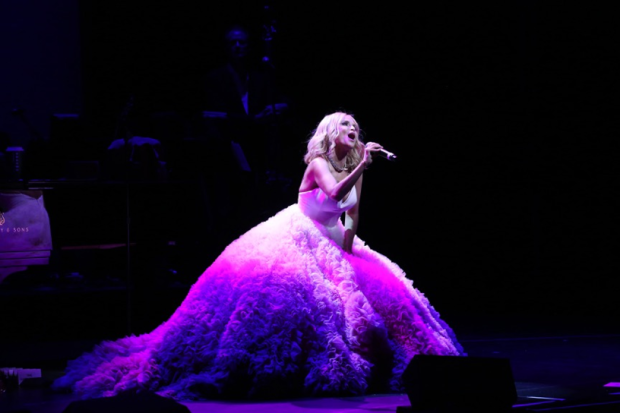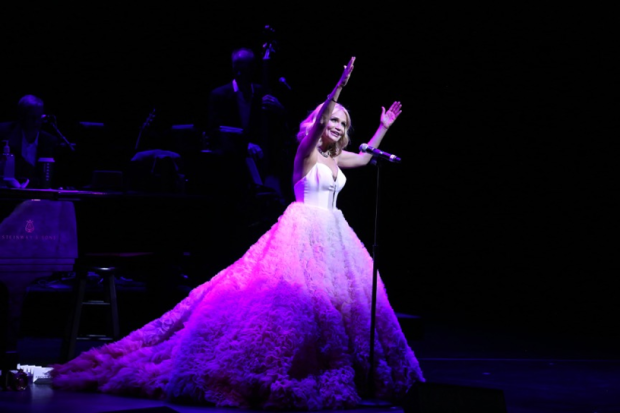Kristin Chenoweth: My Love Letter to Broadway
One of Broadway’s biggest stars takes over the Lunt-Fontanne Theatre for 12 shows.

(© Walter McBride)
You know a performer is confident when she opens her show with "Rose's Turn," the eleven-o'clock number from Gypsy that is the Everest of any true Broadway diva. In actuality, Kristin Chenoweth only performs a few lines from that legendary showstopper in the opening medley for her new concert at the Lunt-Fontanne Theatre, My Love Letter to Broadway, but the point is well taken: Standing at just 4'11'', this pint-size dynamo is a Broadway heavyweight.
A Tony Award winner for You're a Good Man, Charlie Brown, Chenoweth has made regular pilgrimages back to Broadway while maintaining a healthy film and television career. She most famously originated the role of Glinda in Wicked and recently starred in the revival of On the Twentieth Century, an operatic score so difficult, this tireless soprano is one of the few performers who can regularly pull it off eight times a week.
She's not just an ironclad set of pipes though: Singing numbers like Stephen Sondheim's "Losing My Mind" and a passionate rendition of "Bring Him Home" from Les Misérables, Chenoweth proves herself to be the consummate musical-theater actress, playing the intention behind every bar and note. Her achingly emotive rendition of Burt Bacharach and Hal David's "A House Is Not a Home" is one that will bring a lump to your throat.

(© Walter McBride)
She takes the same maximalist approach to her comedy: Clad in a glittering Barbie pink leotard (ostentatious costumes by Christian Siriano), Chenoweth has us roaring with laughter during a special rendition of her Wicked mega-hit, "Popular," which she dedicates to a certain presidential candidate: "When someone tells you that Ohio and Florida are up for grabs, that is not an invitation."
Spontaneity is the lifeblood of any great concert experience, so Chenoweth and director Richard Jay-Alexander include a different special guest for each show: It was Alan Cumming for the night I attended, there to sing "Easy Street" from Annie (Cumming and Chenoweth appeared in the 1999 TV movie adaptation) and reminisce about the time they cohosted the Tonys. He asked if she remembered the King and I skit they did. "How could I forget," she responded, a little wink at the audience about the victor in the Best Actress category that night, Kelli O'Hara.
She may have just one Tony Award (so far), but in sitting down for 12 performances at one of Broadway's larger houses, Chenoweth joins the ranks of Barbra Streisand, Bette Midler, and Liza Minnelli: leading ladies who can keep us transfixed through an entire night crafted around their considerable personalities and talents. Perhaps in a tribute to one of the most notable practitioners of the Broadway concert, Chenoweth sings a snazzy rendition of the James Hanley number "Zing! Went the Strings of My Heart," a Judy Garland standard famously included in Judy at Carnegie Hall. Chenoweth knocks it into the rafters, swinging her big pink skirt behind her as she beams her energy out at the audience. You may feel the urge to get up and dance.
This is even more remarkable since Chenoweth is swinging without the help of brass. Seated at a Steinway grand piano throughout the show, music director Mary-Mitchell Campbell has assembled a band of just five other musicians (all strings and one percussionist). Her arrangements allow for a surprisingly orchestral sound, with violinist Justin Smith getting some especially juicy parts.

(© Walter McBride)
On top of being an extraordinary music director, Campbell has a lovely voice. She sings gorgeous harmony on numbers like Don Henley's "The Heart of the Matter" and Dolly Parton's "Little Sparrow," which turns out to be the most earthy song of the night: Chenoweth brings the band down to a tight circle and performs the song as she would in a jam session.
A different choir joins Chenoweth each night (it was Pace University at my performance) as she takes us to church with Gloria Gaither and Dony McGuire's "Upon This Rock," a contemporary Christian anthem that she describes as "a Jesus song." Even atheists will have difficulty resisting the power of Chenoweth as her voice soars over this number, buoyed along by what seems like divine intervention.
Armed with an Oklahoma twang, Broadway bona fides, and an eclectic taste in music, Chenoweth seems to be the embodiment of America — red, blue, and everything in between. She's a stage and screen star, an LGBT rights advocate, and a devout Christian: all of these fit comfortably within her slight frame. In an age when our country feels increasingly balkanized, Kristin Chenoweth is a reassuring presence, especially in this much appreciated love letter to Broadway.









